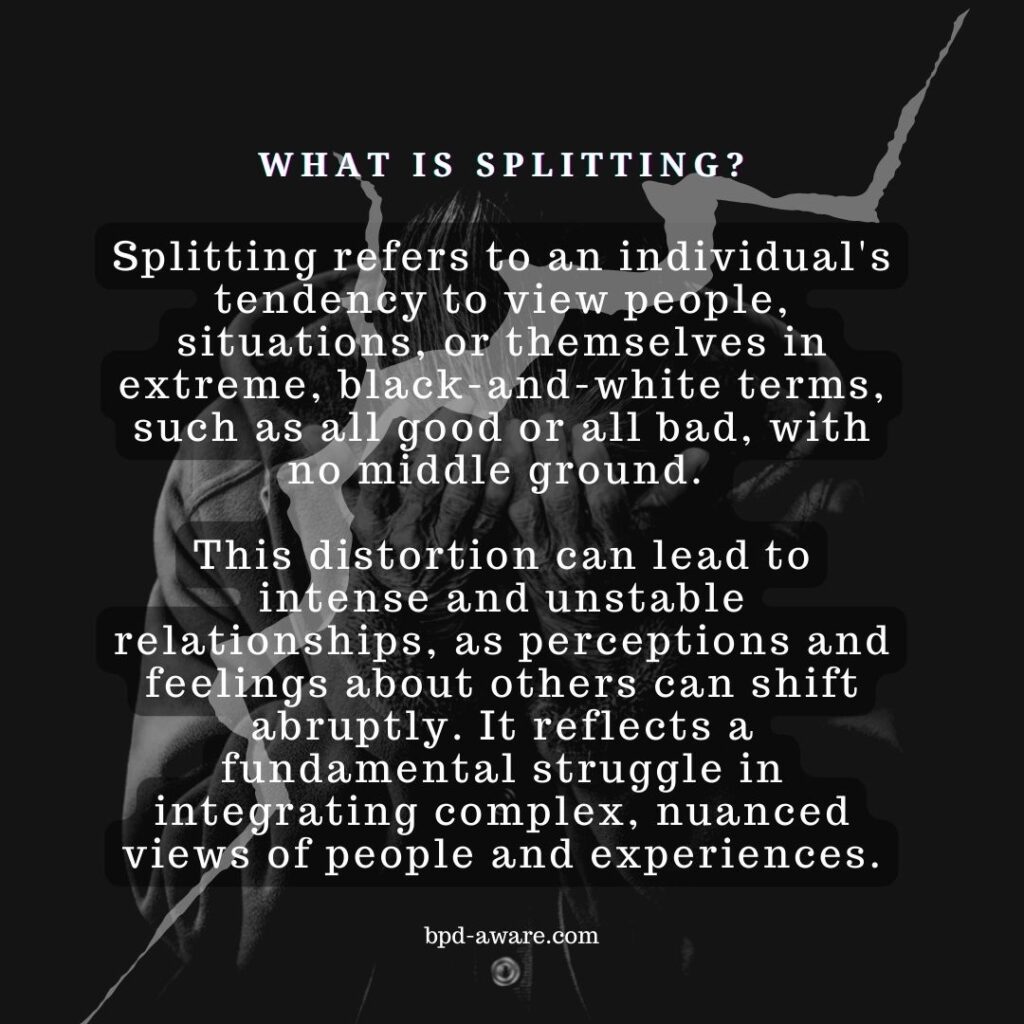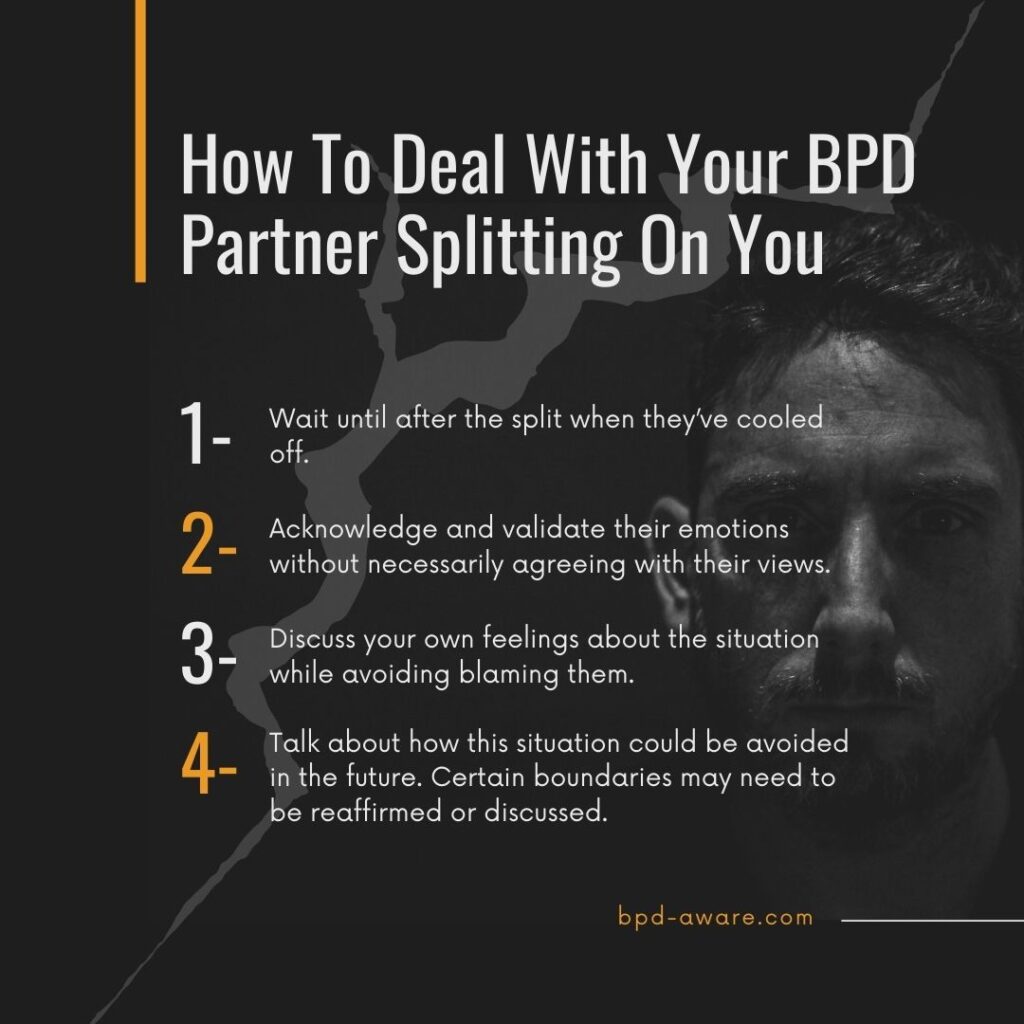Splitting is a common symptom of Borderline Personality Disorder (BPD). When someone with BPD splits they are seeing things in a very binary, black-or-white way. They may believe someone in their life is a perfect angel one moment and then the worst person in existence the next. In reality, someone is more likely to be somewhere in the middle, hopefully towards the good end of the spectrum.
Splitting is a huge challenge to any relationship and, without the proper strategies, can lead to the end of the relationship. Fortunately, there are strategies to help you deal with your partner splitting. These techniques can help you and your partner strengthen your relationship and reduce the impact of splitting.

Why Do People With BPD Split?
Splitting is a defense mechanism employed by people with BPD when they feel vulnerable. It’s not just people with BPD who split. People with depression, anxiety, and Post-Traumatic Stress Disorder can also split. Even mentally healthy people can split, especially in times of stress.
People with BPD don’t consciously choose to split, it’s an automatic response to certain situations where they may feel unsafe or uncertain. That uncertainty provides a lot of gray areas and scary possibilities. By adopting black-or-white thinking, the splitter tries to make things more certain, and more understandable for themselves.
For example, if someone with BPD doesn’t receive what they perceive to be enough affection from their partner, this can cause them to feel vulnerable and uncertain about the relationship. They might begin to question whether their partner truly loves them, if their partner has lost interest in them, or if their partner is thinking about leaving them. In reality, it may just be that their partner has been a little tired or is struggling with a situation outside the relationship. But the person with BPD sees it as the relationship being under threat. To combat this, they may begin to split and devalue their partner. Suddenly, in their splitting mind, their partner “never treated them well” and has always been a “monster”. This allows the person with BPD to no longer feel threatened by the prospect of a break-up, they might now actively encourage it!
The black-or-white nature of splitting is cognitively less demanding than trying to see the gray area of a situation where there are so many possibilities, many of which are rather mundane. What splitting does is reduce the opportunity for the kind of open and honest dialogue that strengthens relationships.
How It Feels When Your Partner Splits On You
Living with BPD is undoubtedly tough and the experience of a devaluing split is never fun. However, it’s also an awful experience for you, the partner of someone with BPD. When your partner splits on you, you likely feel attacked and demonized, and those are very valid feelings. It’s also likely that such attacks will make you feel unfairly judged and possibly lower your self-esteem. Those feelings can trigger some strong emotions of your own.
When both partners are feeling intense negative emotions towards each other, rarely is the outcome a positive one.
How To Deal With Your Partner Splitting On You
When your BPD splits on you and you feel attacked, the most important thing to do is NOT to attack back. Your BPD partner is operating on a highly emotional level while they’re splitting. To attack them back will only elevate their emotions even higher, making them more irrational. Fighting fire with fire is rarely a good idea when it comes to emotional situations.
Likewise, do not attempt to reason with your partner or justify yourself while they’re running hot. In their emotional state, your partner will not listen to reason. They’ll try and twist your reasoning and justifications and throw them back at you. They may do this with verbal attacks or internally in their mind. Either way, there’s no winning that battle.
When your BPD partner is splitting, they’re emotionally red-hot. Think of them as a smoking engine. You know that the engine needs fixing, but you wouldn’t just stick your hands in there while it’s smoking. If you did, you’d get burned. What you NEED to do is wait until they’ve cooled off before engaging with them.
When your partner has cooled off and their split appears to be de-escalating, you should attempt to engage with them. Sit down with your partner and have a calm conversation with them. Avoid “you statements” like, “You made me feel horrible” or “You only care about your own feelings”. These are accusatory statements and are likely to make your partner feel awful about their behavior and cause further issues, or they may split on you again. Instead, try to use “I statements” such as “I feel like my actions have been misunderstood” or “I’d like to know how you feel about all this now”. I statements allow you to get your message across and ask questions without sounding like you’re blaming your partner.
In those heated moments, it can be hard to forget that your partner is struggling. The odds are, after a split, they feel horrible about splitting on you and are scared that you will leave them. By opening up a calm, open dialogue with them once they’ve cooled off, you can alleviate their worries while also discussing your concerns.
This is also the time to listen to what caused the split in the first place. You may find that their concerns have some degree of validity. This is where you can find some common ground. If you don’t believe this to be the case, this is when you can state your case and provide justification for your actions. For example, if your partner thinks you’ve not been affectionate lately but you believe that there hasn’t been any change, you could point to recent times when you have shown them affection. Again, try to remain calm and cool. You don’t want to escalate an open dialogue into an argument which could cause another split.
After a split has occurred is also a great time to consider your boundaries with your partner. If they’ve said or done something that you believe crossed a line during their split, especially if it’s a boundary you’ve agreed on with them in the past, you should discuss this with them once they’ve cooled down.

Final Thoughts
Having a partner, whether it’s a friend, family member or a romantic partner, who has BPD can throw some unpleasant situations your way. One of the most challenging to deal with is when they split on you. It can make you feel demonized and lower your self-esteem, even if you’ve done nothing wrong.
It’s important to remember that your partner is speaking from a highly emotional space, one with little room for rational thought. When they are in this state, the best thing you can do is wait for them to calm down before discussing the issue with them. If you strike while the iron’s hot, sparks are likely to fly and start a raging fire. Wait for them to cool off.
When they’ve cooled off, that’s the time to discuss the situation with your partner. Open a dialogue, avoid blaming them, but let them know how the situation made you feel, and justify your behavior, if appropriate.
Discuss the steps you can both take to make sure a similar situation doesn’t arise in the future and reaffirm any boundaries you have in place.
This is the most productive way to deal with your BPD partner splitting on you and can reduce splitting over time and strengthen your relationship.
Sources, Resources, and Further Reading
- How Does BPD Splitting Destroy Relationships?: https://mentalhealthcenter.com/how-does-bpd-splitting-destroy-relationships/
- The Destructive Power of BPD Splitting: https://www.nominawellness.ca/post/bpd-splitting
- Why Splitting on Your Partner Is Actually More Painful Than You Think: https://www.youtube.com/watch?v=xdrri02DhBQ
- Splitting in Relationships: Navigating the Impact of Borderline Personality Disorder on Partnerships: https://www.grouporttherapy.com/blog/bpd-splitting-in-relationships
















